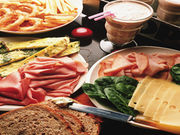At the doctor’s office recently, the nurse weighed me and said, “That’s 5 pounds heavier than last time you were here.”
I was taken back -- not by the news, but that she’d actually made the comment.
“Well, the pandemic happened,” I said. “I baked a lot this past year. And I guess I ate a lot too.”
We both ended up chuckling about it. (Mine was nervous chuckling.) But I couldn’t help but wonder how many other patients were on the receiving end of that kind of comment -- and how many didn’t feel like laughing about it. Yes, the Pandemic gave everyone a chance to stay home, work from home, and it gave us time to work around the house more and spend more time with our families. But we all found out the hard way that too much time around the house means your too close to the kitchen and spending too much time in the kitchen is never a good thing when your watching your weight.
Last year, I urged you to not stress about lockdown weight gain. At the time, many of us thought we were in a short-term crisis, something that would alter our routines temporarily.
But as we head into another fall and winter that are feeling a lot like last year, you may feel like your body, habits, and physical and mental health have never fully returned to what they were before COVID. And that might feel frustrating. Here’s some advice:
Make small adjustments. Some people have used this time to start new exercise regimens or overhaul their eating.
If that’s you, great. But for most of us, extreme changes will only add more stress in an already stressful time. Instead, make tinier, less painful changes that will still make a difference. For me, I scaled back my near-daily baking habit to weekends only and incorporated a couple lighter dinners each week to replace some of the heavier comfort food we were leaning on.
Find movement you enjoy. Movement is more important now than ever. I traded in boot camp workouts for Jazzercise and discovered that incorporating dance into my workouts made all the difference. Going to classes in person and virtually all through last year was vital for my physical and mental health.
Walks with friends -- either in person or on video messaging apps -- were also a lifeline for me.
Plan ahead. As we’re moving into fall and winter, think back at where you struggled the most last year.
Do you need to make some healthy meals for the freezer, stock up on hand weights in case your gym closes, or book a future appointment with a dietitian or therapist?
Give yourself some grace. Even though we’ve had to adjust to these circumstances as a bizarre “new normal,” there’s nothing normal about it. We’re all still living through a crisis, with stressful news that changes rapidly.
Recognize this, give yourself credit for surviving this, and practice self-compassion. And if asking not to be weighed at the doctor’s office would help, you have the right to do that too!
Look for my podcast by searching “How Bad Do You Want To Lose Weight” on the podcast app that you use. You’ll see a piece of my book cover.
If you really want to lose your body fat look for my e-books at the websites listed below. You’ll get information on Healthy eating, exercise, and diet. Instead of spending hours on the internet reading dozens of posts, you can save time by picking up one of my e-books.
There are two e-books. “How Bad Do You Want To Lose Weight?” is available at all the online bookstores selling for $3.99. Go to any of the websites below and search the title to find my e-book. This book gives you all you need to lose weight without spending money on gym memberships, diet plans, or meal plans. Look for my book. at Amazon.com, bn.com, iBooks, Kobo.com, Scribd.com, or Gardner Books in the U.K.
My new e-book is available on Smashwords.com and other online bookstores. Just type “getting to a Healthy Weight” in the search box at the top of the home page.





